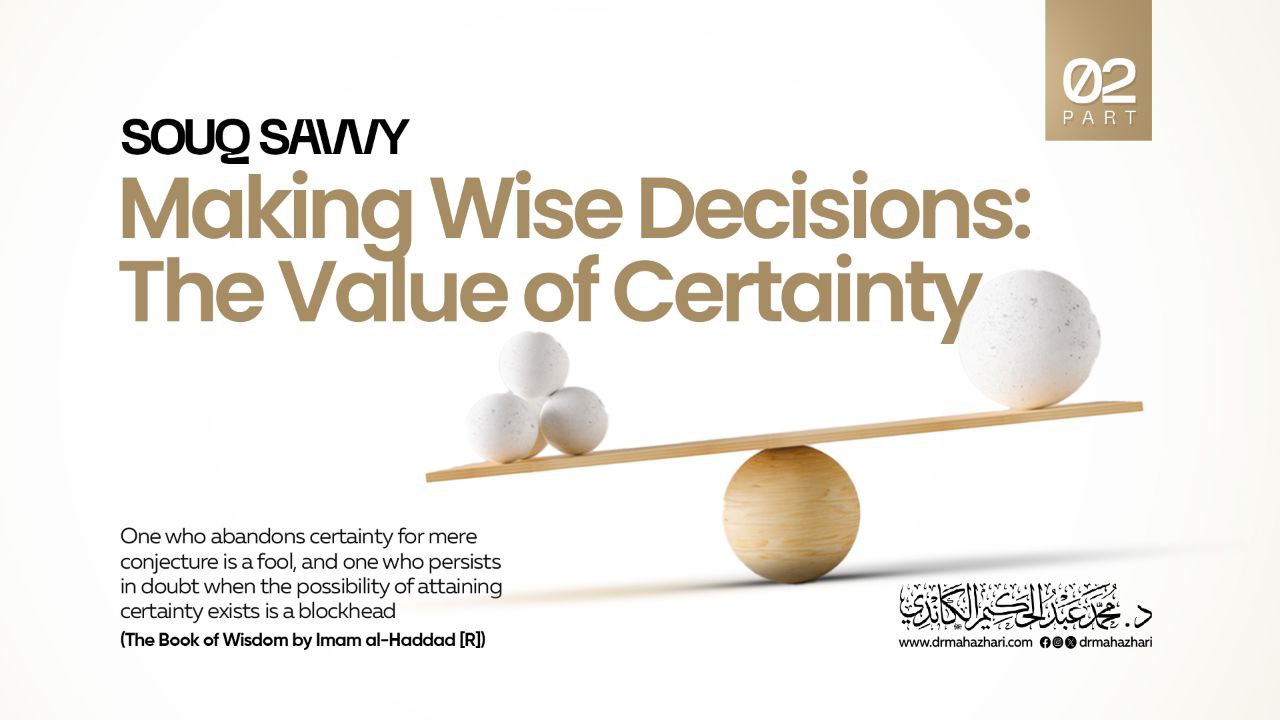Part: 2
Making Wise Decisions: The Value of Certainty
Dr. MAH Azhari

One who abandons certainty for mere conjecture is a fool, and one who persists in doubt when the possibility of attaining certainty exists is a blockhead.
(The Book of Wisdom by Imam al-Haddad[R])
In business management, balancing certainty and doubt is crucial for guiding organizations towards success. The warning against abandoning certainty for mere speculation highlights the dangers of making decisions without solid evidence or careful analysis. Just as a ship relies on navigational charts to safely traverse dangerous waters, businesses need to base their decisions on strong data, market research, and strategic planning. Following trends blindly or adopting untested strategies can lead to costly mistakes, threatening long-term growth and stability.
A powerful example of this is the downfall of Enron, a company once celebrated for its success but ultimately infamous for its collapse. In the late 1990s, Enron's rapid rise was driven by risky financial maneuvers and dishonest accounting practices. Beneath the surface of apparent success, a web of fraud was concealed, which eventually came to light and led to the company’s spectacular failure. Enron's leaders, fueled by unchecked ambition and the desire to maintain an illusion of constant growth, ignored caution and transparency. Their reckless actions resulted in bankruptcy and disgrace, serving as a stark reminder of the dangers of abandoning sound judgment for short-term gains.
This idea is closely related to a key principle in Islamic jurisprudence: "اليقين لا يزال بالشك," meaning "certainty is not overruled by doubt." This principle emphasizes the importance of acting on knowledge that is certain (yaqin) rather than being swayed by mere speculation (wahm). In Islam, the pursuit of knowledge is highly valued, and making decisions based on weak evidence is discouraged because it can lead to mistakes. Islam encourages seeking clarity when faced with doubt, urging believers to strive for understanding. For example, if someone performs ablution for prayer and later doubts its validity, they should proceed with the prayer, trusting in the initial certainty of having done it correctly. Similarly, in business, a well-founded plan based on thorough market research should not be abandoned due to mere accusations and doubts. Instead, seeking advice from experts or gathering more data is advised to strengthen decision-making.
By the same token, employers should trust and have good faith in their employees, and not act on baseless accusations without thorough investigation. This aligns with the Quranic verse: "O you who have believed, avoid much [negative] assumption. Indeed, some assumption is sin." (Surah Al-Hujurat, 49:12) and the Prophet Muhammad's ﷺ saying: "Beware of suspicion, for suspicion is the falsest of speech."
Islam also promotes a balanced approach to decision-making, valuing wisdom and reason. While certainty is important, Islam also encourages taking precautions and seeking clarification when doubt arises. This approach helps prevent impulsive decisions based on speculation and avoids the paralysis that can come from excessive doubt. Islamic scholars recognize different levels of knowledge, with certainty (yaqin) being the highest, followed by probable knowledge (zann), and then doubt (shakk). This understanding highlights the importance of holding firm to what is certain while acknowledging the complexities of knowledge.
